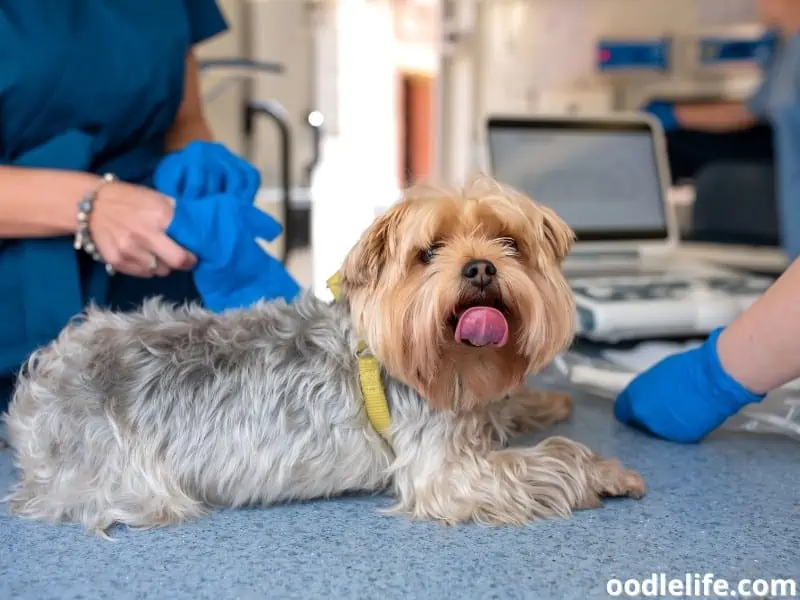Yorkie Health Issues
In a perfect world, your Yorkie would live as long as you. But since a Yorkie’s average lifespan is 11 to 15 years old, the moment usually comes when they show signs of health issues.
Some Yorkie health issues even happen at a younger age. So, I’ll help you understand some of the most common health problems that Yorkies face and tips for helping your Yorkie to stay happy and healthy for as long as possible.

9 Prevalent Yorkie Health Issues
From birth health issues to ailments that come with old age, below are some of the most common health issues your Yorkie might encounter.
1. Legg-Perthes Disease
Legg-Perthes disease is a common condition in small dogs like Yorkies. Signs typically begin showing during a Yorkie’s first couple of months of life because of a lack of blood supply to the ball at the top of the femur. The lack of blood will eventually cause the femur bone to die, and veterinarians believe this phenomenon is likely genetic.

Symptoms of Legg-Perthes disease include limping, visible pain, and a lack of muscle around the affected joints and legs. You’ll also likely notice that your Yorkie avoids putting weight on the leg(s) that are bothering them.
The Fix
Usually, the only way to fix Legg-Perthes disease is surgery. You can opt for your vet to remove the ball of the femur or do a complete hip replacement. If you leave Legg-Perthes untreated, it will likely result in painful arthritis for your Yorkie.
2. Liver Shunts
Liver shunts are another Yorkie health issue, but you’ll notice it from birth this time. It occurs when the blood bypasses the liver via the wrong vessel instead of the standard veins. As a result, your Yorkie’s liver can’t do its job of filtering toxins and wastes in its blood.

Detecting liver shunts can be tricky, given that Yorkies typically display generic symptoms such as lethargy, vomiting, and stunted growth. They may have seizures in severe cases.
The Fix
Your veterinarian can determine if your Yorkie has liver shunts via bloodwork or an MRI. They may suggest surgery to fix the problem. Alternatively, you might be able to use natural medicine like milk thistle and dandelion to help your Yorkie’s body detox without needing to use its liver.
3. Hypoglycemia
If your dog has a blood glucose concentration of less than 60 mg/dL, they have hypoglycemia. In other words, low blood sugar. Hypoglycemia is common in Yorkie puppies, as they haven’t built the muscle mass and fat needed to store sufficient glucose.

Signs that your Yorkie is suffering from hypoglycemia include if they’re having trouble walking, acting disoriented, and showing overall weakness.
The Fix
You can often treat hypoglycemia at home by rubbing honey or sugar water on your Yorkie’s gums. It’s also imperative to feed your puppy multiple smaller meals throughout the day to keep their blood sugar levels high.
That said, I encourage you to take your Yorkie to the vet if you suspect they have hypoglycemia. Many hypoglycemia symptoms overlap with other health issues on this list, so it’s good to rule out more severe conditions.
4. Luxating Patella
Luxating Patella is one of the Yorkie health issues that arise from genetics or an injury. It happens when the muscles and tendons around the kneecap can’t hold it in place, so it pops out. Although young Yorkies often develop luxating patella, you usually won’t notice it until your dog is at least three years old.

Signs that your Yorkie has a luxating patella include hopping on three legs and overall lameness. In severe cases, your pet may have trouble walking.
The Fix
Anti-inflammatory medication is often enough to help mild cases of a luxating patella. Swimming therapy and massages are also effective. If your Yorkie has a severe case of luxating patella, it may need surgery.
5. Collapsed Trachea
Sadly, collapsed tracheas are common in Yorkies and other small dog breeds. The reason is that the tracheal cartilage partially or almost fully obstructs your dog’s windpipe, making it difficult for them to breathe. A collapsed trachea is sometimes the result of genetics.

Other times it happens from controllable environmental factors.
Signs that your Yorkie has a collapsed trachea include difficulty breathing and gagging that sounds like a cough. They may also have trouble swallowing when they eat.
The Fix
Your veterinarian may prescribe a steroid or cough suppressant to help alleviate distress from your Yorkie’s collapsed trachea. You should also put your dog on a weight loss plan if they’re overweight. Using a harness instead of a collar is also crucial to prevent an episode of difficulty breathing from a collapsed trachea.
6. Retinal Dysplasia
Retinal dysplasia is a genetic condition in Yorkies involving abnormal retina development. You’ll know within the first couple of weeks of life if your Yorkie puppy has retinal dysplasia, and the condition usually doesn’t worsen after that time. It’s common for retinal dysplasia to impact both eyes.

The symptoms of retinal dysplasia vary depending on how severe of a case your Yorkie has. In some cases, you might not even know they have it. In others, you’ll notice your Yorkie has trouble seeing things; they might even be entirely blind.
The Fix
Unfortunately, it isn’t possible to fix retinal dysplasia. If your dog has severe retinal dysplasia, keep their routine the same so that they know where to find their food, water, and bed.
7. Pancreatitis
Pancreatitis is exactly how it sounds if you recognize “itis” as a cue for swelling — it’s swelling of the pancreas organ. Unlike many conditions I’ve covered, pancreatitis isn’t genetic. Instead, it occurs from external factors, such as feeding your Yorkie processed foods with high fat and no natural enzymes.

Certain medications can trigger pancreatitis.
Symptoms of pancreatitis include diarrhea, vomiting, pain when you touch your dog’s stomach, and a fever.
The Fix
Your veterinarian will be able to diagnose pancreatitis based on a blood test. Your Yorkie may need an IV and hospitalization until they stabilize. After that, you’ll need to put your dog on a low-fat diet and a weight loss plan should it be overweight.
The good news is that most Yorkies with pancreatitis have a full recovery and can go on to live a long life.
8. Periodontal Disease
Researchers estimate that periodontal disease impacts approximately 80% of all dogs, regardless of their breed. The condition occurs when your Yorkie’s mouth becomes infected with the bacteria periodontitis.

You likely won’t notice periodontal disease in your Yorkie until it’s in the more advanced stages. Symptoms include gum erosion, tooth loss, inflamed gums, and bad breath.
The Fix
Your veterinarian may have to extract some of your Yorkie’s teeth in severe periodontal cases. But you can reverse milder cases by brushing your Yorkie’s teeth daily, giving them plaque-fighting chew toys, and taking them to the vet to get their teeth professionally cleaned yearly.
9. Bladder Stones
If you’ve ever had a bladder stone, you can relate to how your Yorkie feels. Bladder stones are relatively common in Yorkies, and they occur when the build-up of minerals forms a rock-like structure in your dog’s bladder.

Some signs that your Yorkie has bladder stones include difficulty urinating, blood in their urine, and a strong, pungent urine odor. You also may notice your Yorkie having accidents in the house, and they might be lethargic and lose their appetite.
The Fix
Luckily, your Yorkie can recover from bladder stones and proceed to live a long life. Your veterinarian will recommend one of three ways to treat this issue: dietary dissolution, urohydropropulsion, or surgery. The best-fit option for your Yorkie will depend on the bladder stone’s type and size.
In some cases, you might be able to prevent bladder stones from happening to your Yorkie in the future by changing their diet. Other times, bladder stone occurrences are harder to stop since they result from bacterial infections.
Common Health Issues Affecting Any Dog Breed
Yorkies are intelligent, but they have a higher chance of experiencing the health problems I described above compared to many other dog breeds. But they could also fall victim to several other health issues that any dog may have, including:
- Allergies
- Diarrhea
- Constipation
- Skin irritations

Many of these issues involve your Yorkie’s diet. Ensuring you feed your dog high-quality food and working with your veterinarian to get to the bottom of any food or environmental triggers that could cause them allergies or skin irritations is crucial.
Maximizing Your Yorkie’s Health
One of the best ways to prevent Yorkie health issues from the get-go is by giving your business to a reputable breeder that’s careful with breeding Yorkies with strong genes.
I also recommend taking your Yorkie to the vet for yearly checkups and brushing their teeth often because preventing periodontal disease can positively impact the rest of their health.
Of course, a Yorkie can’t live forever. But by being proactive about their health early on, you’ll give your pet the best chance of living a long and healthy life.